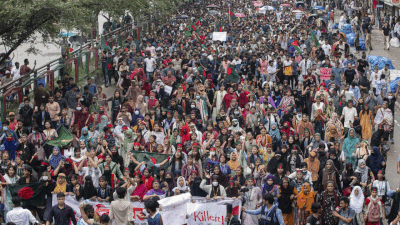Recent anti-government protests in Bangladesh have resulted in nearly 100 fatalities and hundreds of injuries, as tensions escalate across the nation. Demonstrators demand the resignation of Prime Minister Sheikh Hasina, while she accuses them of “sabotage.” In response to the unrest, the government has imposed an indefinite curfew and cut off mobile internet services.
Key Events:
– Violence and Casualties: According to Prothom Alo, at least 95 people have died, including 14 police officers. Channel 24 reports 85 deaths. The violence intensified after students initially protested against a quota system for government jobs, which has now spiraled into widespread unrest.
– Government Response: The military has enforced a new curfew, and the government has declared a holiday from Monday to Wednesday, with courts closing indefinitely. Social media platforms like Facebook and WhatsApp have been made inaccessible.
– Mass Arrests: Authorities have arrested at least 11,000 people in recent weeks. Schools and universities are shut, and a shoot-on-sight curfew was briefly imposed.
– Public Reaction: Protesters have called for a “non-cooperation” movement, urging citizens to avoid paying taxes or utility bills and to skip work. Despite this, many offices, banks, and factories remain open.
Incidents and Clashes:
– Dhaka: Significant violence occurred in various neighborhoods, including Uttara, where police used tear gas against blockades, and Shahbagh, where the Bangabandhu Sheikh Mujib Medical University was attacked.
– Nationwide: Protests and clashes were reported in several districts, including Sirajganj, Cumilla, Feni, and Munshiganj. The unrest has led to numerous deaths and injuries among both protesters and police.
Political Implications:
Prime Minister Hasina has been accused of heavy-handed tactics, including the use of force against demonstrators. She has invited student leaders for talks, but her offer was rejected with a call for her resignation. The opposition Bangladesh Nationalist Party and the banned Jamaat-e-Islami party are believed to be influencing the protests.
Historical Context:
The protests initially began over a controversial quota system that reserved 30% of government jobs for the families of veterans from Bangladesh’s 1971 war of independence. The Supreme Court recently ruled to reduce this quota to 5%, allocating the remaining positions based on merit.
Looking Ahead:
The ongoing protests present a significant challenge for Hasina, who has been in power for over 15 years and secured her fourth consecutive term in a recent election boycotted by major opposition parties. As violence continues, the future remains uncertain, with both sides standing firm on their demands.







